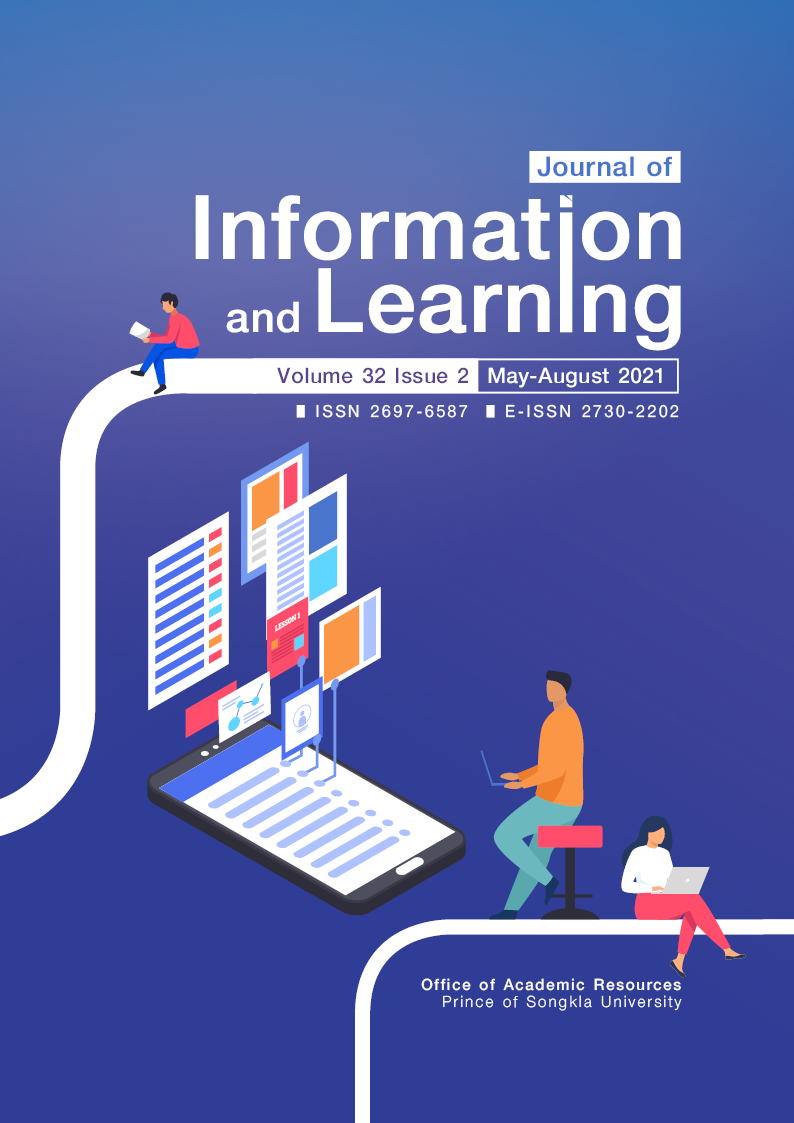Effectiveness of the Administration of Higher Education Institutions in the Digital Disruption Era
Main Article Content
Abstract
The purposes of this research were: 1) to study the level of administration effectiveness of higher education institutions in the digital disruption era, 2) determine the influence of factors affecting the administration effectiveness, and 3) suggest practical guidelines for developing the administration effectiveness. The studies applied a mixed methodology, using the explanatory sequential design. For the quantitative method, the sample size was 300 executives from 38 Rajabhat universities which were obtained by multi-stage sampling. Data were collected by using a 5-rating scale questionnaire, analyzed by using frequency, percentage, mean, standard deviation, and structural equation models. As for the qualitative method, data were collected from in-depth interviews of key informants, 15 administrators of Rajabhat universities who provided data via telephone interviews. Data from selecting purposive of key informants were analyzed by using content analysis. The results showed that the level of administration effectiveness of higher education institutions in the digital disruption era provided all causal factors mean at the highest level.The total effect variables affecting the administration effectiveness were reorganization management, leadership, educational administration, and innovation organization as 0.60, 0.48, 0.47, and 0.29, respectively. Practical guidelines for developing the administration effectiveness should emphasize the following issues 1) communication ability 2) vision, strategy and targets 3) values and culture 4) high-performance work system 5) stakeholders engagement, and 6) employment of graduates.
Article Details

This work is licensed under a Creative Commons Attribution-NonCommercial-NoDerivatives 4.0 International License.
The Journal of Information and Learning is operated by the Office of Academic Resources, Prince of Songkla University. All articles published in the journal are protected by Thailand copyright law. This copyright covers the exclusive rights to share, reproduce and distribute the article, including in electronic forms, reprints, translations, photographic reproductions, or similar. Authors own copyrights in the works they have created as well as the Office of Academic Resources. The Journal reserves the right to edit the language of papers accepted for publication for clarity and correctness, as well as to make formal changes to ensure compliance with the journal's guidelines. All authors must take public responsibility for the content of their paper.
References
Aonlaor, C., Bangwiset, S., Saenpao, K., & Aonlaor, S. (2020). Digital era leadership for educational administration. College of Asian Scholars Journal, 10(1), 108-119.
Barns, W. (2012). Path dependence and behavioral lock-in at work: The challenge of sustaining high performance work system in the U.S. Journal of Business and Economics Research, 10(6), 325-331.
Blunch, N. J. (2013). Introduction to structural equation modeling using IBM SPSS statistics and AMOS (2nd Ed.). Cornwal: MPG books group.
Chaisuwan, S., Seetalarom, S., & Saengwong, W. (2020). Transformation of Thai higher education in student crisis era. Journal of Suvarnabhumi Institute of Technology, 6(1), 686-702.
Chatthong, N. (2018). Context Thailand government to step into an innovation organization. Journal of Information, 17(1), 25-35.
Drucker, P. (1999). Management challenges for the 21 st century. Harvard Business Review (p. 215). Retrieved from http://103.5.132.213:8080/jspui/bitstream/123456789/1378/1/Management%20Challenges%20for%20the%2021st%20Century%20%28%20PDFDrive.com%20%29.pdf
Hair, J. F., Black, W. C., Babin, B. J., & Anderson, R. E. (2010). Multivariate data analysis (7th Ed.). NY: Pearson Education.
Khumsamart, S., Kuljittree, S., & Juntapala, K. (2020). The guidelines for educational administration in the digital distribution era. Journal of Modern Learning Development, 5(3), 245-259.
Kongpetdit, C., & Chantuk, T. (2016). Change management role of leadership and organizational communication. Veidian E- Journal, Silapakorn University, 9(1), 895-919.
Kline, R. B. (2011). Principles and practice of structure equation modeling. (3rd Ed.). New York: The Guilford Press.
Leonidou, E., Christofi, M., Vrontis, D., & Thrassou, A. (2020). An integrative framework of stakeholder engagement for innovation management and entrepreneurship development. Journal of Business Research, 119, 245-258. Retrieved from https://doi.org/10.1016/j.jbusres.2018.11.054
Ministry of Higher, Science, Research Innovation. (2019). Higher education statistics: Academic year 2018. Bangkok: Sino Publishing and Packaging.
Ministry of Higher, Science, Research Innovation. (2021, July 30). Higher education statistics. Retrieved from: http://www.info.mua.go.th/info/
Nueangpanom, P. (2017). Strategic management of Rajabhat universities for sustainable local development (Doctor of education management). Dhurakij Pundit University, Bangkok.
Piampuchana, N. (2018). A causal factor model influencing empowerment in the workplace towards teacher effectiveness in private higher education in the northeast. Dhonburi Rajabhat University Journal, 12(2), 153-169.
Prajankett, O. (2014). Aneducational innovation organization: A new choice of educational administration. Journal of the Royal Thai Army Nurses, 15(1), 45-51.
Puncreobutr, V. (2019). Disruption in Thailand’s higher education. Association of Private Higher Education Institutions of Thailand, 25(1), 94-113.
Rattanaphien, P., & Chaiphan, S. (2018). Structural causal factors of changing leadership and attribute for educational administrators affecting on efficiency of administration in private university. Business Review, 10(1), 73-91.
Suksawang, P. (2014). The basics of structural equation modeling. Princess of Naradhiwas University Journal, 6(2), 136-145.
Teerathanachaiyakun, K. (2014). Knowledge management succees factors. Panyapiwat Journal, 5(Special issue), 134-143.
Trairat, C., & Sinjindawong, S. (2020). The development of school to innovation organization: A case study of vibhavadi academic group under the secondary educational service area office 2. Conference presentations graduate research 15th Rangsit University (pp. 1903-1914). Retrieved from https://rsujournals.rsu.ac.th/index.php/rgrc/article/view/1846
Van De Voorde, K., & Beijer, S. (2015). The role of employee HR attributes in the relationship between high-performance work systems and employee outcome. Human Resource Management Journal, 25(1), 62-78.


